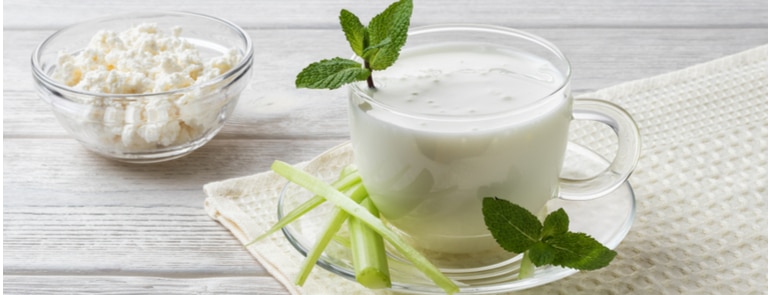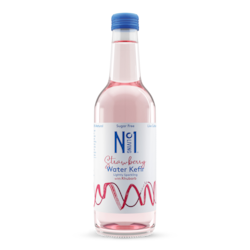15% off £30 OR 20% off £40
What is milk kefir? Benefits & types

Kefir is the latest probiotic-packed drink to cause a stir in the health world. Recently popular in the West, kefir has been drunk in the Caucasus region for hundreds of years.
The first drinkers of kefir, the mountain shepherds of the Caucasus, believed that the Prophet Mohammed gave them the bacterial cultures that make kefir as a gift.1
People have considered kefir to be curative for its entire history. In Soviet Russian hospitals, kefir was considered a treatment for digestive disorders.2
Although kefir’s healing powers might not be that potent, they’re still considerable.
Kefir is jam-packed with probiotics and essential nutrients, including protein, calcium, vitamin B12, niacin, and folate.3
In this article, we’ll explain what kefir is, what it’s suitable for, how kefir can support you in your weight loss goals, and how to make kefir at home.
In this article, we will cover
- What is milk kefir?
- Why is milk kefir good for you? 10 benefits
- Kefir nutritional profile
- How to make kefir at home
- Kefir recipes you need to try
- Kefir FAQs
- What is kefir: Summary
What is milk kefir?
Kefir is a fermented milk drink with a tangy taste, slightly fizzy, and 1% alcohol content.
Milk is fermented with kefir grains, gelatinous bacterial cultures which contain as many as 61 probiotic bacteria and yeasts.4
The high probiotic content promotes digestive health.5
Why is milk kefir good for you? 10 benefits of milk kefir:
Kefir can help support you in a healthy lifestyle. Here are a few of kefir’s benefits:
-
High probiotic content
Scientific studies have connected the high probiotic content of kefir to a wide range of health benefits.
These include better cholesterol, a healthy immune system, enhanced wound healing, and fewer instances of cancer.6
Probiotics contain beneficial bacteria that create a diverse microbiome in our gut, supporting many of our bodily processes.
For more on this, read our article on friendly bacteria in the gut.
-
Anti-bacterial
Kefir’s high probiotic content helps to combat the adverse effects of harmful bacteria, including Salmonella and E. Coli.7
It does this by strengthening our immune system, preparing our body to inhibit or fight toxins that may enter our body.
-
Promotes bone health
Osteoporosis and bone fractures pose a greater risk as we age.
However, kefir shows promise in promoting bone density and enhancing bone health, encouraging resilience against osteoporosis and fractures.8
As the most common form of kefir is milk kefir, this is likely due to the high levels of calcium.
-
May increase your metabolism
Foods and by-products created by fermentation, such as yoghurt, kimchi, miso, and kefir, produce lactic acid bacteria.
This helps friendly bacteria to thrive in your gut and is believed to potentially increase your metabolism by helping your gut to break down food.9
-
Kefir for weight loss
Probiotic food and drink encourage health by increasing healthy gut flora, which is linked to better health outcomes, including a lower instance of age-related disease.10
As well as promoting good health, scientific studies also show probiotics are likely to promote weight loss.11
Adults on a high-fat diet who consume a lot of probiotics are less likely to put on weight than those on the same diet who don’t.
People who consume probiotics while trying to lose weight may be more successful.12
However, kefir is relatively calorific for a drink and contains approximately 168 calories per 240ml serving.13
The calorie content is higher than that of kombucha, another fermented drink with a probiotic content that’s made from tea.
A 240ml serving of kombucha contains approximately 45.6 calories.14
-
Aids digestion
The probiotics in fermented foods and drinks, such as kefir, have also been linked to supporting your digestion.
One study found that probiotics could alleviate several chronic digestive issues, including irritable bowel syndrome (IBS) and Antibiotic Associated Diarrhoea, amongst others.15
It’s believed that probiotics help beneficial bacteria to thrive in your gut, allowing them to support the process of digestion and lessen the effects of digestion-related issues.
-
Packed with vitamins & nutrients
We’ll get into the full nutritional profile of milk kefir shortly, but one 175ml serving of milk kefir contains calcium, phosphorus, vitamin B12, riboflavin, magnesium, and vitamin D.16
Each of these supports your body and mind in a variety of different ways, as you can tell from this long list of health benefits!
-
Helps to regulate your mood
To quote one of our favourite articles on gut health, “not only does the brain know what is happening in the gut, the gut has access to the emotional and cognitive centres in the brain too.
This means that conditions in the gut have an impact on what the brain does and how we feel, and conversely how we feel emotionally can impact on how the gut functions.”17
In other words, a balanced diet is a balanced mind.
Handpicked content: How the brain and the gut are connected.
-
Consumable for those with lactose intolerance
For people with lactose intolerance, it is the lactose in milk which results in digestive issues.
However, the lactic acid bacteria found in fermented dairy foods turn lactose into lactic acid, which reduces the levels of lactose found in the final milk kefir product.
Due to this, even those with lactose intolerance can often tolerate milk kefir in comparison to regular milk.19
Summary
- As a fermented product, it contains probiotics—beneficial bacteria!
- Helps your body to fight off toxins.
- Promotes bone health with high levels of calcium.
- Supports an increased metabolism and may support your weight loss goals.
- Aids digestion by creating a diverse microbiome of beneficial bacteria.
- Packed with nutrients and vitamins.
- The gut-axis relationship may help to regulate your emotions.
- May reduce the symptoms of allergies or asthma.
- Even those with lactose intolerance can often drink milk kefir.
It’s worth noting that Emily Rollason, Holland & Barrett’s expert nutritionist, does warn that there are fewer studies on the benefits of kefir, and although the above health benefits above have been found previously, further research may be needed to truly understand the long-term benefits of milk kefir.
Kefir nutritional profile: Kefir vs other drinks
Let’s take a look at the nutritional profile of milk kefir vs other dairy or non-dairy alternatives, comparing the percentages of vitamins and minerals they contain for your daily recommended intakes.
| Milk kefir20 | Whole milk21 | Full-fat yoghurt22 | Soya milk23 | Kombucha24 | |
|---|---|---|---|---|---|
| Calories | 168 | 146 | 149 | 131 | 13.4 |
| Vitamin A | 77 re (10.8%) | 5% | 5% | 0% | 0% |
| Vitamin B1 (Thiamin) | .108mg (12%) | 7% | 5% | 10% | 9% |
| Vitamin B2 (Riboflavin) | .49mg (36%) | 26% | 20% | 10% | 9% |
| Vitamin B6 | .09mg (5.5) | 4% | 6% | 9% | 9% |
| Vitamin B12 | .3mcg (12%) | 18% | 15% | 0% | 9% |
| Vitamin C | .72mg (1%) | 0% | 2% | 0% | 0% |
| Vitamin D | .25mcg (2.4%) | 24% | 0% | 0% | 0% |
| Vitamin E | .22mcg (1.5%) | 1% | 1% | 1% | 0% |
| Vitamin K | Varies | 1% | 1% | 9% | 0% |
| Iron | .12mg (.8%) | 0% | 1% | 9% | 0% |
| Potassium | 372mg (9.2%) | 10% | 11% | 8% | 0% |
| Calcium | 305mg (30%) | 28% | 30% | 6% | 0% |
| Magnesium | 30.5mg (7.5%) | 6% | 7% | 15% | 0% |
| Phosphorus | 228mg (32%) | 22% | 23% | 13% | 0% |
| Zinc | 1.1mg (12%) | 7% | 10% | 2% | 0% |
As you can see, although kefir has higher amounts of certain vitamins and minerals, such as vitamin A, vitamin B2, and phosphorus, it is relatively similar in many regards to alternatives dairy or non-dairy products.
This is not all that surprising, considering that the health benefits of kefir are mostly based on the increase and balance of beneficial bacteria in the gut, something which nutritional data does not quantify.
How to make kefir at home: DIY kefir milk
- Place kefir starter grains (the bacterial culture) in a jar with a glass of milk (or milk alternative, there’s no best milk for making kefir, so choose whichever you like best). Add one spoon of grains per glass.
- Cover the jar with a muslin cloth and leave at room temperature for 24 hours.
- Pour through a sieve to catch the kefir grains and refrigerate the liquid.
- Once cooled, enjoy a cold glass of kefir.
- Place the grains from the sieve in another glass of milk and begin again!
Vegan kefir milk alternatives
It’s surprisingly easy to make your kefir milk vegan, swapping out dairy milk for any of the plant-based milk kefir options below—or even swapping out milk entirely for water!
There’s no best milk for kefir grains, so you may want to try:
- Soya milk kefir.
- Coconut milk kefir.
- Rice milk kefir.
- Oat milk kefir.
- Cashew milk kefir.
- Almond milk kefir.
- Coconut water kefir.
- Water kefir—that’s right, even water kefir benefits your gut health!
Kefir recipes you need to try
Here are a range of tasty kefir recipes to help you work the benefits of kefir into your daily menu.
1. Kefir breakfast recipe:
Kefir-layered breakfast pots are as easy to make as they are delicious for breakfast.
All you need is kefir yoghurt, granola, your favourite fruits (we like blueberries!), and perhaps some sugar or honey for those with a sweet tooth.
2. Kefir lunch recipe:
- Turn your grill to high heat and let it heat up.
- Bring a small pan of water to the boil and simmer green beans and spring onions (4 mins).
- Drain and pat these dry with kitchen roll.
- Toss with 1 tablespoon of oil and move over to a baking tray with sliced tomatoes.
- Season with black pepper.
- Grill for 10 mins until your vegetables begin to char.
- Remove from the grill and leave to cool slightly.
- While your vegetables are grilling, create your kefir dressing!
- Whisk kefir yoghurt with 1 teaspoon of oil, mustard powder, vinegar, and a dash of salt and pepper together until smooth.
- Prepare a plate or bowl with lettuce leaves, tuna, olives, and hard-boiled eggs.
- Add your charred onions, green beans, and tomatoes.
- Drizzle your kefir dressing and serve.
3. Kefir dinner recipe:
Cajun Chicken Traybake with Sweet Potato Wedges & Chive Dip26
A hearty dinner idea for treating yourself or entertaining guests, all with the benefit of building up your beneficial gut bacteria with a kefir yoghurt chive dip.
Simply swap out the chicken and dairy yoghurt for a plant-based alternative and this recipe can be completely vegetarian or vegan.
Creating your marinade:
- Heat your oven to 200C/180C fan/gas 6.
- Mix cumin, paprika, oregano, and thyme together, and season with black pepper.
- Put one tablespoon of this mix aside for your potatoes.
- Use the rest of the mix and rub over your chicken.
- Cut peppers, onions, and celery and toss them into a large roasting tin with 1 tablespoon of oil.
- Cut your sweet potatoes into wedges and place these to the side (not in the roasting tin).
- Place your chicken into the centre of the roasting tin with the veggies spaced evenly around the edges.
- Roast for 40 minutes.
- Once your chicken is roasting, turn your attention back to your sweet potato wedges.
- You have 5 minutes until they need to go into the oven, so quickly coat these with 1 teaspoon of oil and the spice mix you made earlier.
- Place onto a baking tray and put into the oven once the chicken has 35 mins of roasting left.
- Stir your milk kefir yoghurt—or non-dairy kefir alternative yoghurt—with chives.
- For a slightly runnier dip, you can add one tablespoon of water.
- Remove the roasting tin and sweet potatoes from the oven and place the chicken onto a warm plate to rest for 5 mins.
- Turn up to 220C/200C fan/gas 7.
- Return the roasted veg to the oven for 5-10 mins.
- Plate up your chicken, wedges, roasted veg, and your kefir yoghurt chive dip.
4. Kefir dessert recipe:
5. Kefir snack recipe:
Need a little snack to get you through the day?
Soda bread is a quick pick-me-up snack that you can make at home and combine with a salted butter and kefir for all the health benefits (and all the flavour).
Summary
- Kefir is easy to make at home; simply mix milk kefir starter culture with your choice of milk or non-dairy alternative and wait 24 hours.
- There are many vegan milk kefir options, including soya kefir, coconut milk kefir, almond milk kefir and more.
- It’s easy to increase your intake of kefir as it can be included in recipes from morning to night, helping your microbiome to thrive.
Kefir FAQs
Yes. As long as you only have one serving of kefir per day alongside a balanced diet, there appear to be no negative side effects of drinking (or consuming) kefir every day.
You can drink kefir at any time throughout the day, although it is best to avoid drinking it just before you go to bed. This is because it aids your digestion and may affect your sleep.
Short-term storage: Store your kefir grains in milk inside a clean jar (not all the way to the top). It can be stored this way for up to two weeks before the milk requires changing.
Long-term storage: Boil some water and allow it to cool before pouring it over kefir grains in a colander. Pat the kefir grains dry with two cotton towels, aiming to remove all moisture. Cover your kefir grains with dry milk powder inside freezer-safe glass jars or zipper-seal bags and freeze for up to two months.
As milk is often used as a base ingredient for kefir, kefir is generally just as healthy as milk, although it also comes with the benefits of probiotics for your gut health.
As kefir helps to support your digestive system, it can also help to make you more regular or even reduce the effects of chronic IBS or diarrhoea.
This varies depending on the person. Some swear by drinking kefir on an empty stomach as this allows the gut to truly benefit from all its goodness. Others, however—especially those with a more sensitive stomach or chronic digestive conditions—recommended drinking kefir alongside a meal to reduce the immediacy of its effects.
Yes! As it helps your body to fight toxins and works as an anti-bacterial, it can help to support healthy skin.
Kefir will last up to two weeks in the refrigerator if it is completely submersed in milk.
What is kefir? The summary
Kefir is the latest trend in gut health, using kefir grains to combine your favourite drinks and recipes with live bacteria that helps to support your body in many ways, from digestion and metabolism to weight loss.
If you’re still interested in gut health, we think you might love to read “Can Probiotics Support Weight Loss,” “Do Fermented Foods Improve Gut Health?” and “What Is Kombucha: Benefits & Side Effects.”
Last updated: 21 February 2022
- https://matadornetwork.com/read/history-kefir-caucasus/
- https://www.semanticscholar.org/paper/Renewed-Interest-in-Kefir%2C-the-Ancient-Elixir-of-Shavit/e29875958df13ef6d4055daeff0b4e51040e0c6e?p2df
- https://www.semanticscholar.org/paper/Renewed-Interest-in-Kefir%2C-the-Ancient-Elixir-of-Shavit/e29875958df13ef6d4055daeff0b4e51040e0c6e?p2df
- https://www.ncbi.nlm.nih.gov/pmc/articles/PMC4854945/
- https://www.webmd.com/food-recipes/features/why-is-kefir-good-for-me#1
- https://www.ncbi.nlm.nih.gov/pmc/articles/PMC4854945/
- https://www.ncbi.nlm.nih.gov/pmc/articles/PMC4052788/
- https://pubmed.ncbi.nlm.nih.gov/25278298/
- https://pubmed.ncbi.nlm.nih.gov/21745625/
- https://www.ncbi.nlm.nih.gov/pmc/articles/PMC3983973/
- https://www.ncbi.nlm.nih.gov/pmc/articles/PMC5082693/
- https://www.ncbi.nlm.nih.gov/pmc/articles/PMC5082693/
- https://ndb.nal.usda.gov/fdc-app.html#/food-details/432442/nutrients
- https://ndb.nal.usda.gov/fdc-app.html#/food-details/515456/nutrients
- https://www.ncbi.nlm.nih.gov/pubmed/22529959
- https://ndb.nal.usda.gov/ndb/foods/show/01289
- https://pubmed.ncbi.nlm.nih.gov/22314561/
- https://www.ncbi.nlm.nih.gov/pubmed/17869642
- https://www.ncbi.nlm.nih.gov/pubmed/12728216
- https://www.yemoos.com/pages/milk-kefir-nutritional-profile
- https://nutritiondata.self.com/facts/dairy-and-egg-products/69/2
- https://nutritiondata.self.com/facts/dairy-and-egg-products/104/2
- https://nutritiondata.self.com/facts/legumes-and-legume-products/4387/2
- https://nutritiondata.self.com/facts/custom/2162871/0?quantity=1.13
- https://www.bbcgoodfood.com/recipes/charred-veg-tuna-nicoise-creamy-kefir-dressing
- https://www.bbcgoodfood.com/recipes/cajun-chicken-traybake-with-sweet-potato-wedges-chive-dip
- https://www.olivemagazine.com/recipes/baking-and-desserts/spring-onion-and-turmeric-kefir-soda-bread/

















